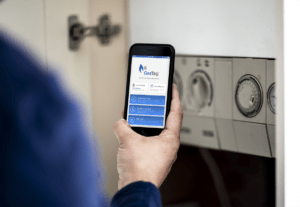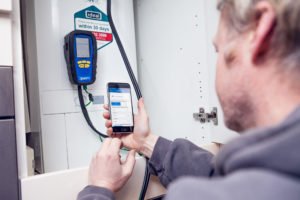Gas Safety
Gas safety: Gas Tag defies UK’s tick-box safety culture
Last year, a company named Gas Tag decided to innovate the gas safety industry with a piece of technology that can save lives, regulate the entire industry, offer real-time evidence for site visits and log the efficiency of gas appliances in a single dashboard.
The business has just been shortlisted as a finalist for the New Business of the Year category in the Lloyds Bank National Business Awards on account of its fast growth and revolutionary mission.
In this interview, Paul Durose, CEO and Founder of Gas Tag sheds a light on the fraudulent gas safety industry – which doesn’t include a lot of safety – alongside his personal outlook towards wellbeing, employee culture and avoiding a burnout.
What did the gas safety industry look like before Gas Tag?
 Paul Durose (PD): “I’ve been in the construction industry since the age of 17. I set up my own business in 2007 working on large-scale social housing contracts, working mainly new build and regeneration projects. In 2010 I created a heating division within the construction business. That’s where my interest and passion for gas safety began.
Paul Durose (PD): “I’ve been in the construction industry since the age of 17. I set up my own business in 2007 working on large-scale social housing contracts, working mainly new build and regeneration projects. In 2010 I created a heating division within the construction business. That’s where my interest and passion for gas safety began.
“When I set up a heating division in my construction company, I learnt that the industry was in desperate need of innovation. I also learned that it only takes a couple of ‘cut corners’ for major issues to arise.
“We were interviewing people who had been on 4-6 weeks courses to become gas safety engineers – it was like getting a driver’s license. And I’d ask them if they were ready to go out and start working, and despite being qualified, they’d say, ‘Hang on, does that mean I have to go out on my own?’
“So they’d go off to complete the works, but we had problem after problem.
“I used to go around the office car park on a Friday afternoon and see engineers filling in certificates from previous jobs – when they probably weren’t even on site! How would I know that they were doing the work that they were supposed to do? They got paid £50-£60 per certificate, and some of them were handing in 20-30 certificates a week.”
So there would be no proof they were on site doing the work?
(PD): “None whatsoever. And we were receiving phone calls from tenants saying, ‘I’ve been waiting in all day for my gas safety certificate to be done at the property.’ And I would say, ‘Hang on, I’ve got a certificate from the gas engineer to prove that the work has been done.’ So when I confronted the engineer, I could see him squirming trying to figure out the best answer. And then he said, ‘I must’ve just done the next door’s by accident. I’ll have to go back and do theirs now’.”
Was this just a pick of a bad bunch, or were these issues arising across the UK?
(PD): “There are 23.2 million homes in the UK with gas, and I’ll give you some really daunting figures. There are 1.1 million jobs that get done every year by illegal gas fitters. In 65% of these cases, gas appliances were left in an immediately dangerous condition.
“On top of this, the Which Consumer Report secretly filmed 10 qualified engineers over the space of two years. Five of these were from small businesses and five were from large companies, including British Gas. Shockingly, eight out of 10 engineers broke the law with regards to what they are legally allowed to do.
“Some of them didn’t even do anything. They just filled in the certificate. And then they received payment from the customer then and there. They repeated the experiment again a year later and seven out of 10 engineers broke the law. So, there are some fundamental issues in the industry.”
So how does Gas Tag innovate this process?
 (PD): “If you’re a qualified gas safety engineer, you download the app and put in your national insurance number, your Gas Safe identification number and business registration number. At which point we have an API call to the database to verify in real time that this person is not only qualified, but is also qualified to work on certain appliances. Just because you’re a gas engineer it doesn’t mean you’re qualified to work on ovens, hobs, fires and boilers. In the background, every 24 hours, we check that that engineer is still qualified. If your qualification is set to expire in the next three weeks, you’ll be notified to take a refresher course and qualify again.
(PD): “If you’re a qualified gas safety engineer, you download the app and put in your national insurance number, your Gas Safe identification number and business registration number. At which point we have an API call to the database to verify in real time that this person is not only qualified, but is also qualified to work on certain appliances. Just because you’re a gas engineer it doesn’t mean you’re qualified to work on ovens, hobs, fires and boilers. In the background, every 24 hours, we check that that engineer is still qualified. If your qualification is set to expire in the next three weeks, you’ll be notified to take a refresher course and qualify again.
“On the property side of things, there’s a small microchip tag – which is where the name Gas Tag comes from. It goes around the gas meter pipe which feeds into the property. We use the same technology as Oyster Cards, used on the London Underground, so that when the engineer arrives at the property, he touches his device against the tag. That engineer is then geo-tagged to prove that they were there on site at that specific time.
“The engineer must take photographs – which are also is geo-tagged. The app takes the engineers through a series of questions so that they don’t miss anything. Once the engineer has answered all the questions, the gas safety certificate is generated. This information is uploaded to an online dashboard providing evidence to the landlord that they’ve met their legal obligations. The app also allows the engineer to call the tenant, report any important information – like a vulnerable tenant, and provide proof that access was attempted if even if it was unsuccessful. Access issues cost the housing sector quite a bit of money. Our technology helps to reduce some of these costs.”
So the technology actually implements an element of safety that wasn’t there before?
(PD): “Exactly. What we’ve seen from Grenfell, for example, is that we live in a tick-box culture. The UK housing sector is in a state of denial when it comes to gas safety.
“Compliance should be a by-product of safety, not the other way around. We recently ran a survey and spoke to 162 people from housing associations, local authorities and gas industry experts across the UK.
“What we’re seeing is that many associations still take comfort in being technically compliant. In other words, as far as they are concerned, they are carrying out the necessary tasks to satisfy the regulators.
“Gas safety is rightly at the top of their agenda. But there is a worrying trend towards compliance for the sake of it, which in some cases can be little more than a box-ticking exercise.”
There’s a reputation for a lot of new businesses to do really well and then burn out – how do you tackle that risk on a personal level?
 (PD): “I think because we’ve created something brand new, it’s very exciting and I’ve learned a lot. I don’t think I will burn out. I do switch off. I’ve learned from a failed business that bringing everything home with you is not good. It’s toxic.
(PD): “I think because we’ve created something brand new, it’s very exciting and I’ve learned a lot. I don’t think I will burn out. I do switch off. I’ve learned from a failed business that bringing everything home with you is not good. It’s toxic.
“You will burn out if you take things home and you open your laptop up when your kids are trying to play with you, or you’re trying to watch TV. Your life is over. There’s no point. It’s not about living to work is it? It’s about working to live.”
What advice would you give to young business-minded professionals?
(PD): “Be honest, show your weaknesses and explain them.
“I don’t try to hind behind the fact that I’ve had a failed business and I’ve made mistakes in the past. I kind of wear that as a badge of honour. I think in the UK we’re starting to come around to the idea that it’s ok to fail because you learn from it when you move forward.”
You can meet Gas Tag’s CEO and 120 other innovative finalists in the Lloyds Bank National Business Awards on the 13th November at the Grosvenor House Hotel. Click here to secure your seat.
Gas safety: Gas Tag defies UK’s tick-box safety culture
Paul Durose, CEO and Founder of Gas Tag sheds a light on the fraudulent gas safety industry – which doesn’t include a lot of safety – alongside his personal outlook towards wellbeing, employee culture and avoiding a burnout.
Jenna Kamal
SHP - Health and Safety News, Legislation, PPE, CPD and Resources
Related Topics
Suspended prison sentence for builder over gas safety failures
Commercial and industrial HVAC systems: Balancing efficiency with safety
Unregistered gas fitter jailed for illegal and unsafe gas work

 Paul Durose (PD): “I’ve been in the construction industry since the age of 17. I set up my own business in 2007 working on large-scale social housing contracts, working mainly new build and regeneration projects. In 2010 I created a heating division within the construction business. That’s where my interest and passion for gas safety began.
Paul Durose (PD): “I’ve been in the construction industry since the age of 17. I set up my own business in 2007 working on large-scale social housing contracts, working mainly new build and regeneration projects. In 2010 I created a heating division within the construction business. That’s where my interest and passion for gas safety began. (PD): “If you’re a qualified gas safety engineer, you download the app and put in your national insurance number, your Gas Safe identification number and business registration number. At which point we have an API call to the database to verify in real time that this person is not only qualified, but is also qualified to work on certain appliances. Just because you’re a gas engineer it doesn’t mean you’re qualified to work on ovens, hobs, fires and boilers. In the background, every 24 hours, we check that that engineer is still qualified. If your qualification is set to expire in the next three weeks, you’ll be notified to take a refresher course and qualify again.
(PD): “If you’re a qualified gas safety engineer, you download the app and put in your national insurance number, your Gas Safe identification number and business registration number. At which point we have an API call to the database to verify in real time that this person is not only qualified, but is also qualified to work on certain appliances. Just because you’re a gas engineer it doesn’t mean you’re qualified to work on ovens, hobs, fires and boilers. In the background, every 24 hours, we check that that engineer is still qualified. If your qualification is set to expire in the next three weeks, you’ll be notified to take a refresher course and qualify again. (PD): “I think because we’ve created something brand new, it’s very exciting and I’ve learned a lot. I don’t think I will burn out. I do switch off. I’ve learned from a failed business that bringing everything home with you is not good. It’s toxic.
(PD): “I think because we’ve created something brand new, it’s very exciting and I’ve learned a lot. I don’t think I will burn out. I do switch off. I’ve learned from a failed business that bringing everything home with you is not good. It’s toxic.